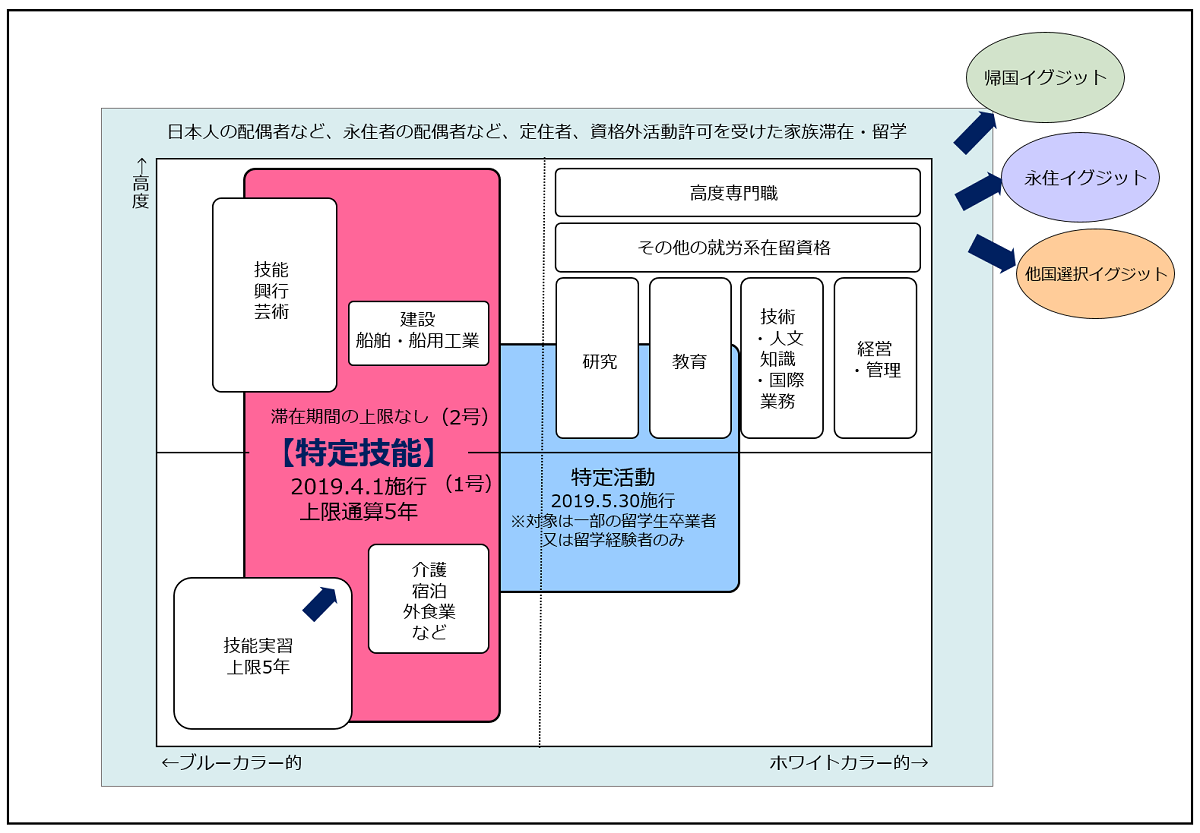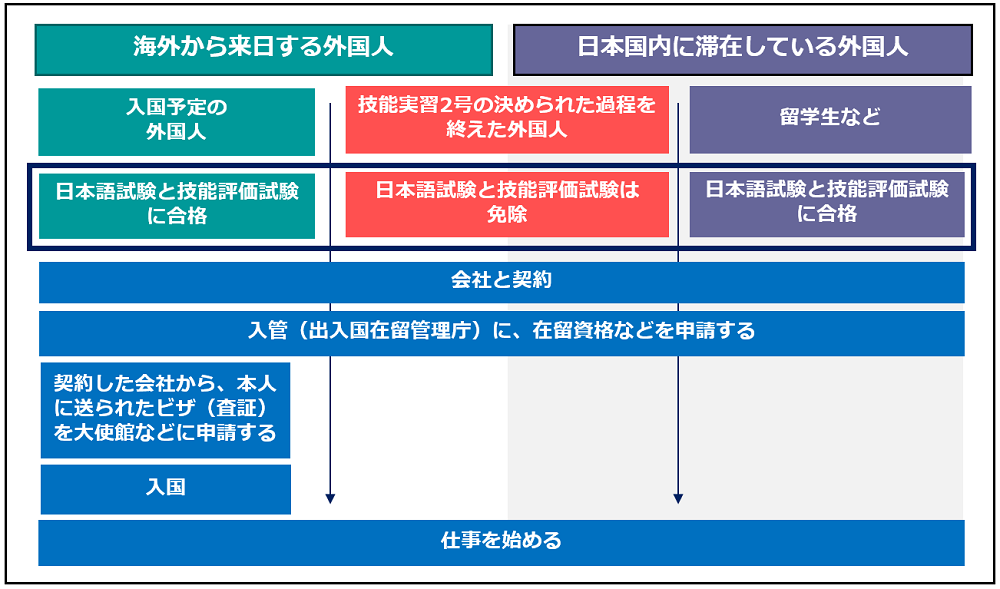
| Nursing care | Work to support people who have difficulty living due to old age or special illness |
|---|---|
| Building cleaning Management | Work to clean the inside of the building |
| Material processing industry | Work to make things using metal parts |
| Industrial machinery manufacturing industry | Work to make machines used in factories, etc. |
| Electrical and electronic information related industries | Work to make electronic components |
| construction | Work to make buildings such as houses and buildings |
| Shipbuilding and marine industry | Work to build a ship |
| Car maintenance | Work to inspect, maintain, and disassemble automobiles |
| aviation | Work to carry luggage to the plane and to inspect and maintain the plane |
| Accommodation | Work for reception, customer service, and restaurant service at the hotel |
| Agriculture: | Work to grow and harvest vegetables and fruits ・ Work to raise animals such as pigs, cows and chickens |
| Fishery: | Work to catch and raise fish |
| Food and beverage manufacturing industry | Work to make food and drink |
| Restaurant business | Work to serve customers, cook, and carry food at restaurants, etc. |
| construction | Work to make buildings such as houses and buildings |
|---|---|
| Ship / Marine Industry | Work to build a ship |
Currently, the Japanese government is considering whether or not 1 fields, excluding long-term care, which are permitted only in Specified Skill No. 11, should be added to Specified Skill No. 2022 in 2.

Until now,Those who work in Specified Skill No. 1 had a five-year deadline to live in Japan... With the addition of jobs in 11 fields excluding "long-term care" to the second specific skill, people working in these 2 fields will also be able to work.The deadline for living in Japan has expired and you can bring your family to Japan.In the field of "long-term care", there is a way to work for a long time with other status of residence, so foreigners may be able to live in Japan indefinitely in all 14 fields.
To work with the status of residence of Specified Skill No. 1, you need to take and pass the Japanese Language Examination and Skills Examination. (People who have completed the specified process with the status of residence "Technical Intern Training No. 2" do not need to take the proficiency test. However, those who want to work in another field must pass the proficiency test in the field they want to work in. After passing the exam and concluding a contract with the company, you can apply for a status of residence for a specific skill.

| 1 | Pass the Japanese Language Examination / Skills Examination, or complete the designated process of Technical Intern Training No. 2. |
|---|---|
| 2 | Contract with the company |
| 3 | Apply for status of residence, etc. to the Immigration Bureau of Japan (Immigration Bureau of Japan) |
| 4 | Come and work in Japan after your visa is accepted |
| 1 | Passed the Japanese language test and proficiency test |
|---|---|
| 2 | Contract with the company |
| 3 | Apply for status of residence, etc. for immigration |
| 4 | 働 く |
| 1 | Apply for status of residence, etc. for immigration |
|---|---|
| 2 | 働 く |
* If you want to change jobs, make a contract with the company you are changing to before 1. 2.

Foreigners who work with the status of residence of Specified Skill No. 1 can receive various support from the company (or the registration support organization requested by the company) when living or working in Japan.There are 10 types of support contents below.
| 1. You can get an explanation from the company before you get the status of residence. After contracting with the company and before applying for status of residence, you can have the company explain "working conditions and contents" directly or online. |
| 2. Pick-up and drop-off when you arrive in Japan and when you return to your country When you arrive in Japan, a company employee will send you from the airport to your office or home.When you return to your country, a company employee will accompany you to the airport security check. |
| 3. Supporting the preparation of a house to live in and contracts for electricity, water, gas, etc. necessary for living You can rent a company house (company house), or a company person can be the guarantor of your house.It also helps you create bank accounts, contracts for electricity, water and gas, and guides and contracts for mobile phones. |
| 4. Orientation for living To make it easier to live in Japan, the people at the company will teach you the rules and manners of Japan.It also teaches you how to ride a train or bus, and what to do in the event of an earthquake or accident. |
| 5. Helping and attending when proceeding with the city hall A person from the company will help you when writing the documents for the procedure.Also, they will come with you when you go through the procedures such as city hall and taxes. |
| 6. Support for studying Japanese A person from the company will guide you to a Japanese language school and study Japanese. |
| 7. Consultation for problems If you have any problems with your work or life, you can consult and get advice in words that you can understand. |
| 8. Interaction with Japanese people The people of the company will guide you to the festivals that are held near the company or your residence, and will create a place to interact with Japanese people. |
| 9. Support when changing jobs (when the company tells you to quit) When the company tells you to quit, the company will help you find your next job and help you with the procedure. |
| 10. Meeting (more than once every 3 months) At your company, we meet regularly with leaders who support you.If you have any problems with your work, you can consult with us. |
(Supervised / Administrative scrivener Bright General Legal Office Representative Specified administrative scrivener Yugo Nagaoka)
Requests for posting jobs, consultations, etc.
Please feel free to contact us.
© 2021 Human Global Talent Co., Ltd.